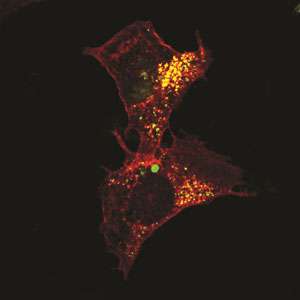Protein induces self-destruction in cancer cells

The role of a phosphatase protein in promoting the self-destruction of healthy cells and the progression of ovarian cancer has been identified by A*STAR researchers. Known to be overexpressed in cancer cells, the protein, which is called PTP4A3, could be useful as a biomarker for disease prognosis.
In order to grow and spread, cancer cells actively exploit some of the body's natural cellular processes. One example of such a process is the self-destruction and recycling of long-lived or damaged cells in the body. This process is known as autophagy and is necessary for maintaining healthy cells.
Autophagy is carried out by organelles known as autophagosomes, whose job is to 'dismantle' cells and transport the unwanted cellular material to be recycled into new membranes and proteins. Autophagosomes go through a maturation process during autophagy, which allows them to carry out their role effectively.
Through performing a series of experiments investigating the role of PTP4A3 in cancer progression, Qi Zeng and co-workers at the A*STAR Institute of Molecular and Cell Biology in Singapore, together with other scientists in Singapore and the UK, have uncovered links between the overexpression of PTP4A3 and the acceleration of autophagosome maturation that occurs during autophagy.
"Our experiments on the expression of PTP4A3 in ovarian cancer cells led us to discover that the protein exploits the autophagy pathway in order to promote cancer cell growth," says Zeng.
The researchers found that PTP4A3 accumulates in autophagosomes, accelerating their maturation process. This in turn encourages the destruction of healthy cells and allows the cancer to take hold (see image). Unexpectedly, Zeng and her team also discovered that PTP4A3 itself then submits to autophagy at a later stage. In this way, PTP4A3 appears to act as a 'fine tuner', restoring balance to the autophagic system after the cancer has progressed.
Following analysis of a large set of data taken from ovarian cancer patients, the team found that high levels of PTP4A3 together with autophagy genes were significantly correlated with poor prognosis in human ovarian cancer patients. "This means that PTP4A3 levels could potentially act as a useful biomarker for prognosis in the future," explains Zeng.
In addition, the researchers found that the inhibition of autophagy reduced PTP4A3-driven cancer cell growth in their experiments.
"This study suggests that autophagy could be used as a potential target for arresting PTP4A3-driven tumor progression in patients with high expression of both PTP4A3 and autophagy genes," says Zeng.
More information: Huang, Y.-H., Al-aidaroos, A. Q. O., Yuen, H.-F., Zhang, S.-D., Shen, H.-M. et al. "A role of autophagy in PTP4A3-driven cancer progression." Autophagy 10, 1787–1800 (2014).














